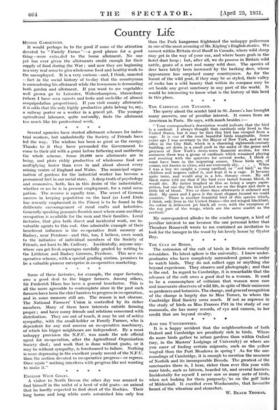* * *
Several agencies have started allotment schemes for indus- trial workers, but undoubtedly the Society of Friends have led the way. The wisdom has been as great as the energy. Thanks to it they have persuaded the Government to come to their aid with a grant before fathering and mothering the whole scheme. Some 50,000 new allotments are in being, and plots richly productive of wholesome food are multiplying faster than ever in and about almost every mining centre of England and Wales. The municipal organ- ization of gardens for the industrial worker has become a permanent fact in our social state. A deep truth of psychology and economics, both, lies in this desire of the industrialist, whether or no he is in present employment, for a rural occu- pation. The reverse is equally true. The secret of German success in keeping population on the land (as Lord Emile has recently emphasised in the Times) is to be found in the deliberate encouragement of rural crafts and industries. Generally speaking peasants flourish most where some ancillary occupation is available for the men and their families. Local factories, that give both direct and incidental work, are in- valuable agents to this end. One admirable example of their beneficent influence is the co-operative fruit cannery at Badsey, near Pershore—and this, too, I believe, owes much to the initiative of individual members of the Society of Friends, not least to Mr. Cadbury. Incidentally, anyone any- where can get fresh asparagus carefully graded by writing to the Littleton and Badsey Growers, Pershore. This new co- operative scheme, with a special grading station, promises to be a valuable pioneer enterprise in co-operative marketing.
* * * *






































 Previous page
Previous page